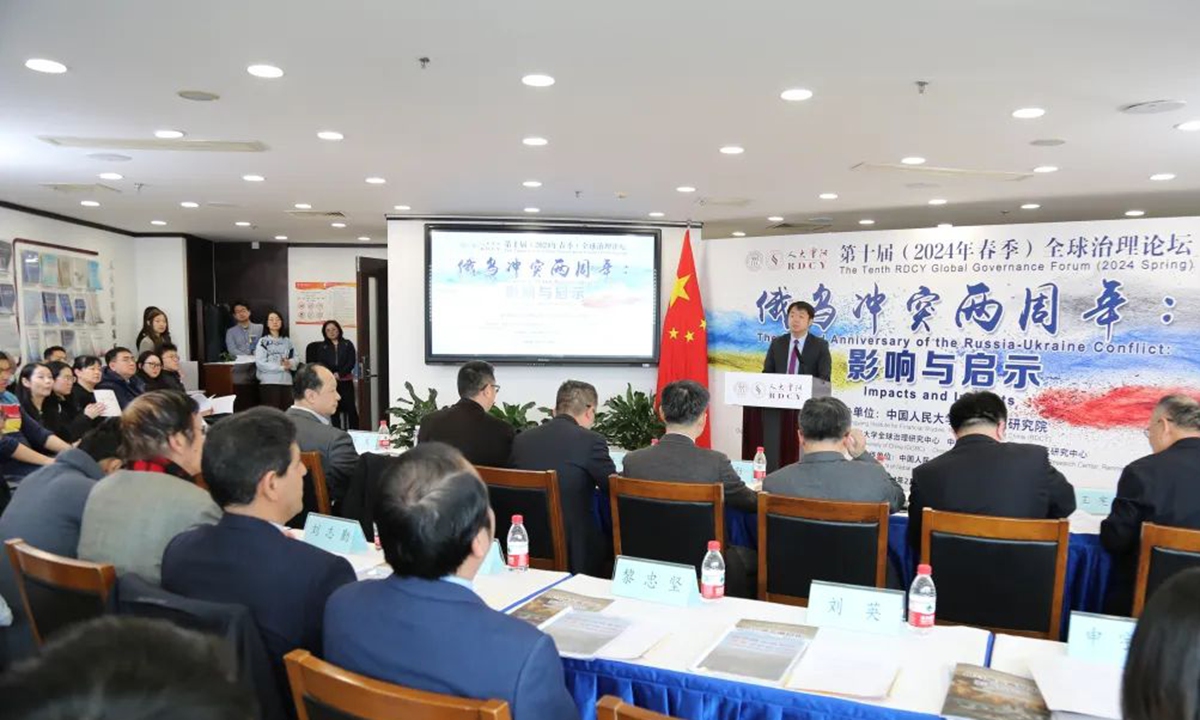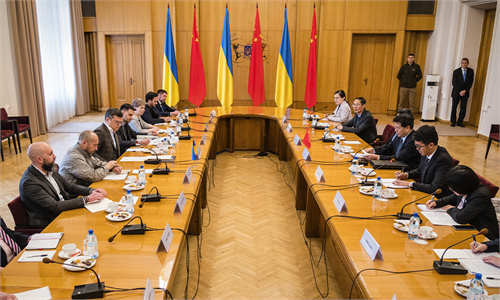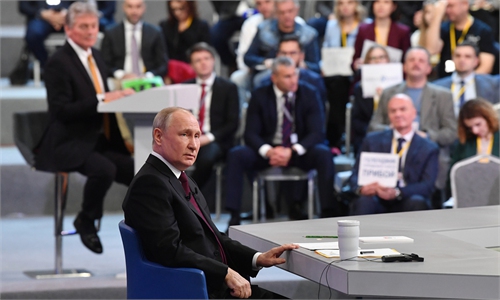
Photo: screenshot from RDCY
As Saturday will see the second anniversary of the Russia-Ukraine conflict, Chinese strategists, economists and experts on international relations have recently given their reviews of the crisis. They have a series of key findings, including that Russia will not be defeated by Western sanctions and weapons, and the Russian economy could re-rise in the future; the war is likely to be a long-term conflict; and the West is losing faith and the US might abandon Ukraine if Donald Trump gets elected later this year.
Although China is not directly involved in the Ukraine crisis, Chinese elites and the public have been paying close attention to the situation, as they care about its impact on the Chinese economy and China's ties with Russia and the West. China has always tried to contribute to the mediation of the crisis and eyed a post-war reconstruction for the two countries, analysts said. They noted that all of these have driven Chinese scholars to make efforts to find valuable information from the conflict and use it to guide China's policymaking.
Profound changes
The Chongyang Institute for Financial Studies at the Renmin University of China (RDCY) held a senimar on Wednesday to release three major reports about the institute's researches in the past two years about the Russia-Ukraine conflict, and the findings about future development of China-Russia relations, as well as Russia's domestic market after Western companies pulled out from the country in 2022.
Wang Wen, executive dean of the RDCY, said at the event that since 2022, he and his team have visited 21 Russian cities, and their biggest finding is that "after more than 20,000 sanctions by the West, Russia received relatively small impact, so we have concluded that Russia will not be defeated by sanctions," but Russia is also unable to gain full victory against Ukraine in the short term.
"The most important conclusion that we have drawn in the report is that the Russia-Ukraine conflict will become a long-term fight," Wang said, citing the newly-released report.
According to the World Economics Research, a London-based institute, the official estimate for Russia's GDP was $4.148 trillion at the end of 2023 in terms of the purchasing power parity (PPP). The institute has developed a database presenting GDP in PPP terms with added estimates for the size of the informal economy and adjustments for out-of-date GDP base year data. World Economics Research estimates Russia's GDP to be $5.733 trillion in 2023, and with this number, Russia ranks No.5 on the list of world economies, following China, the US, India and Japan.
Chinese experts said this result is different from the expectation that many observers had in 2022, when they used to be extremely pessimistic about Russia after the West launched all-out sanctions, and this result has once again proved that Western sanctions are not as scary as expected, and Russia's survival from the sanctions has undermined the US hegemony.
Ding Yifan, former deputy director of the Research Institute of World Development under the Development Research Center of the State Council, said at the event that Russia's experiences in handling Western sanctions are very valuable to China, as China needs to be prepared for the worst-case scenario when the US launches all-out sanctions with extreme hostility against China some day in the future.
Ding said Russia has built a complete supply chain to not only serve its military operation but also ensure the normal operation of its economy, so that Russian people's daily lives get almost no impact from the on-going war and Western sanctions.
The RDCY report also said that a key change that happens in the international system after the outbreak of the Russia-Ukraine conflict is that trade and finance have been weaponized by the West in the past two years, with the global supply chain and industry chain being seriously interrupted.
"Another key experience of Russia is that it develops and maintain its ties with non-Western countries, or the Global South, and it also reduced its reliance on the US dollar and the euro. After the outbreak of the Ukraine crisis, non-Western countries, especially the major powers like BRICS members, didn't follow the West to sanction Russia, and this is also a key reason why Russia can withstand pressures from the West," Ding said.
The sanctions launched by the West have frightened many non-Western countries, including the BRICS members and many Middle East major countries, and this is the reason why think tanks of many non-Western countries are researching about reducing reliance over US dollars and US-dominated international payment system, Ding noted.
Future of the conflict
In 2022, many analysts believed that the US-led NATO was using Ukraine to undermine Russia's strength, but now, with the Russia's control over the stronghold Avdiivka, it seems that Moscow is using the war with Kiev to undermine the whole West, and this makes Western elites losing faith to maintain their support to Ukraine, and many of them are considering getting rid of the crisis, experts said.
Ma Xiaolin, dean of the Institute for Studies on the Mediterranean Rim at Zhejiang International Studies University, told the Global Times on Wednesday that as the US presidential election is near, Russia is unlikely to take a big risk to launch any new major operation, and what Moscow needs to do right now is to be patient and to focus on economic recovery, and wait and see who will become the next US president.
Donald Trump said that as president he would be able to resolve the Ukraine war in one day, the Wall Street Journal reported on May 11, 2023.
"How could Trump end the war in one day? Can he defeat Russia in one day? It's impossible. But, to abandon Ukraine in one day, that's feasible for Trump for sure, and the US is very likely to do so if Trump returns to the White House," Ma noted.
Many elites in European countries have increasingly doubted the necessity of assisting Ukraine to fight Russia, and they are being prepared to adjust their policy to support Ukraine as they have seen no meaningful outcome from the battlefield while Russian troops control more and more territories,Cui Hongjian, a professor with the Academy of Regional and Global Governance at Beijing Foreign Studies University, told the Global Times on Sunday. Cui attended the just-concluded Munich Security Conference in Germany.



